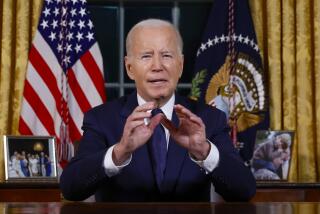Bush Gets a Timeout
- Share via
Prior to the invasion of Iraq, America’s claim to be the world’s sole superpower commanded widespread legitimacy. Now many nations, including some once numbered among our closest allies, are having second thoughts.
The dominant position that the United States enjoyed after the Cold War rested on two pillars. The first was the sheer reality of American preeminence -- economic, technological, cultural and especially military. The second was the tacit endorsement of that preeminence by all of the other leading powers. Although not everybody deferred to America’s writ -- witness periodic eruptions in places like the Balkans and the Persian Gulf -- the nations that had themselves nursed (and may still nurse) their own dreams of being No. 1 did.
Great-power deference to the U.S. reflected not feelings of warmth and affection but calculations of self-interest. For Beijing, intent on transforming China into an economic powerhouse, Washington’s vision of a globalizing world offered lucrative opportunities. For Moscow, consumed by dire crises at home, cultivating U.S. support made more sense than picking fights. For Paris, Berlin and Tokyo, American willingness to assume responsibility for maintaining international stability was more than welcome, if only because it spared their own affluent but aging and morally spent populations from footing the bill.
To be sure, American “global hegemony” elicited periodic outbursts of Chinese suspicion, Russian resentment and (especially) French jealousy, but by and large the major powers went along with the idea of a global Pax Americana. If nothing else, any plausible alternative looked worse.
But this acceptance of American dominion was not guaranteed to last forever; it was not providentially ordained. Rather, it was contingent on Washington demonstrating responsibility and self- restraint. As the world’s sole superpower, the U.S. needed to exercise its prerogatives in ways that reassured rather than alienated others.
For all of their other shortcomings, George H.W. Bush and Bill Clinton seemed to grasp this requirement. Viewed in retrospect, their main achievements -- for the elder Bush, Operation Desert Storm, and for Clinton, Bosnia and Kosovo -- hardly appear to be masterstrokes of statecraft. But both presidents pursued their goals with an eye toward reinforcing rather than undercutting international acceptance of American primacy. Clinton was especially adept at smoothing the rough edges off of American hegemony, endorsing “enlightened” initiatives like the Kyoto accord and the International Criminal Court even though he had no intention of securing their ratification.
Since 9/11, George W. Bush has followed a radically different course.
Vowing to extirpate evil, promulgating a doctrine of preventive war and disdaining the niceties of multilateralism, his administration has undermined the assumption that a world in which the U.S. exercises preponderant power is a world well suited to the interests of all. Suddenly, the 800-pound gorilla camped in the world’s living room appears to be not reliably domesticated but prone to wild mood swings and erratic behavior.
These concerns came to a head when Bush declared his intent to overthrow Saddam Hussein. When the administration brushed aside international opposition to war and U.S. forces prevailed with apparent ease, nations such as France, Germany and Russia could do little apart from refusing to ratify the result. The alternative -- banding together and rearming to prevent any further misuse of American power -- was too unpalatable even to contemplate. With the U.S. having apparently gotten away with discarding the old rules and writing new ones more to its liking, “Old Europe” was left to pout.
But in the months since President Bush declared an end to “major combat operations,” the political tables have turned. The war continues and gives every appearance of being long and costly. In the bat of an eye, the U.S. has gone from being conqueror to supplicant, hustling for troops and money to assist in liberating Iraq.
But Iraqi freedom wasn’t the issue when the war began, and it isn’t the issue now. Nor at this juncture is the issue terror. It is the world’s determination to show the U.S. the error of its ways.
Despite their relative military weakness, nations that opposed the war are now in a position to punish the U.S. for having disregarded their counsel. They do so not with an eye toward causing the U.S. to fail -- outright failure in Iraq would not serve their interests -- but to prevent any recurrence of such a misadventure.
So when Old Europe (France in the vanguard) drags its feet about pulling American chestnuts out of the fire, there is more involved than pettiness, cynicism or schadenfreude. This is great-power politics adapted to the present century. Europe wants Bush to twist slowly in the wind. It wants to bring a chastened U.S. to heel. And, unless Bush can persuade Americans to shoulder an ever-mounting burden, Europe just might succeed.
Andrew J. Bacevich is a professor of international relations at Boston University.
More to Read
Get the L.A. Times Politics newsletter
Deeply reported insights into legislation, politics and policy from Sacramento, Washington and beyond. In your inbox three times per week.
You may occasionally receive promotional content from the Los Angeles Times.










